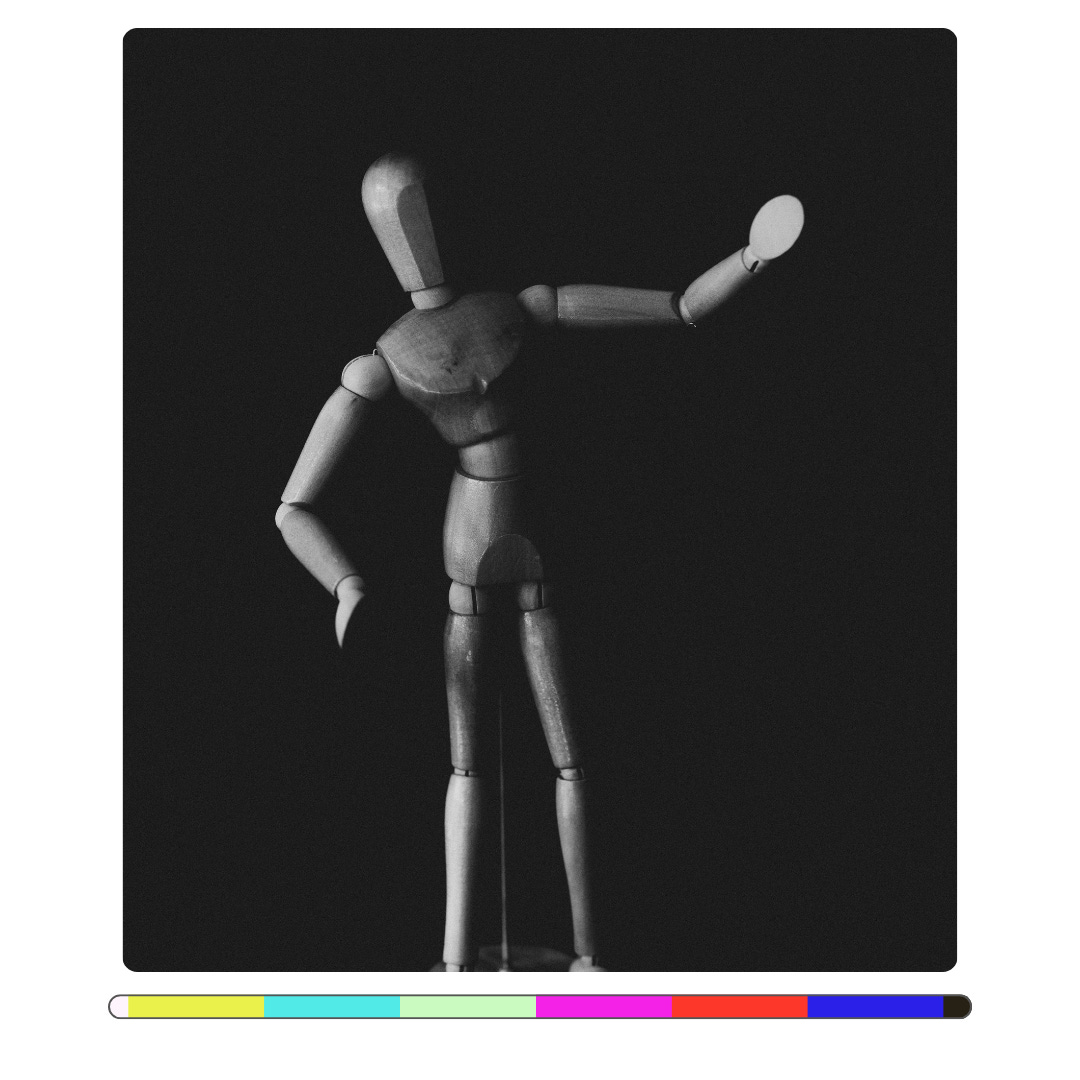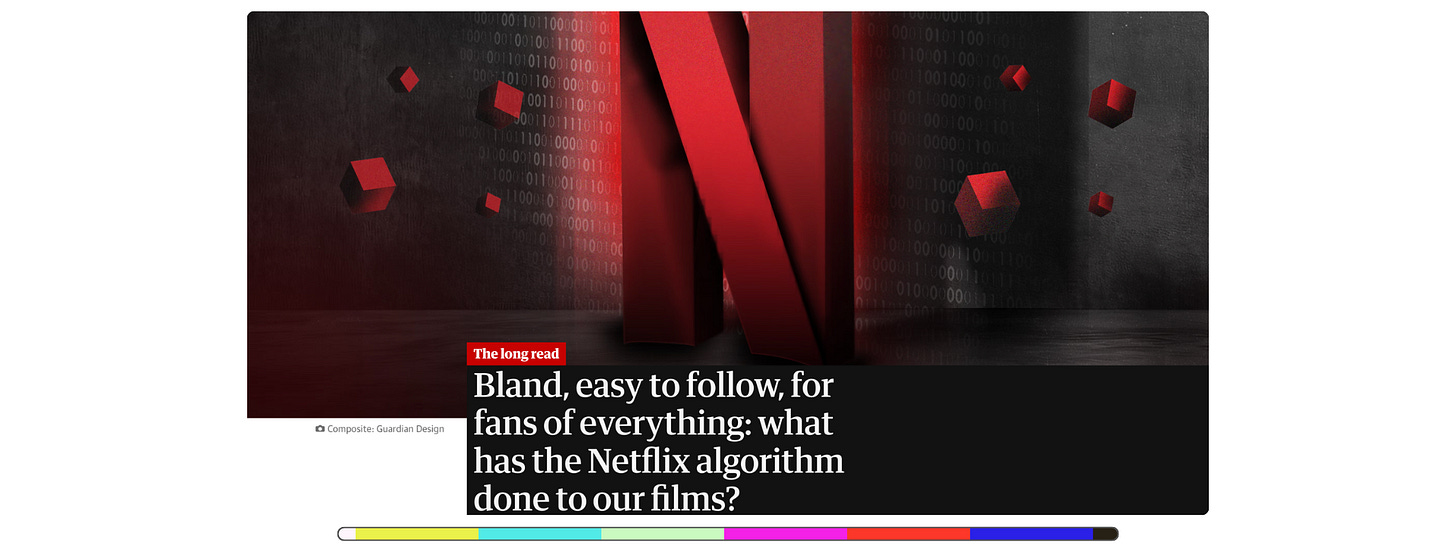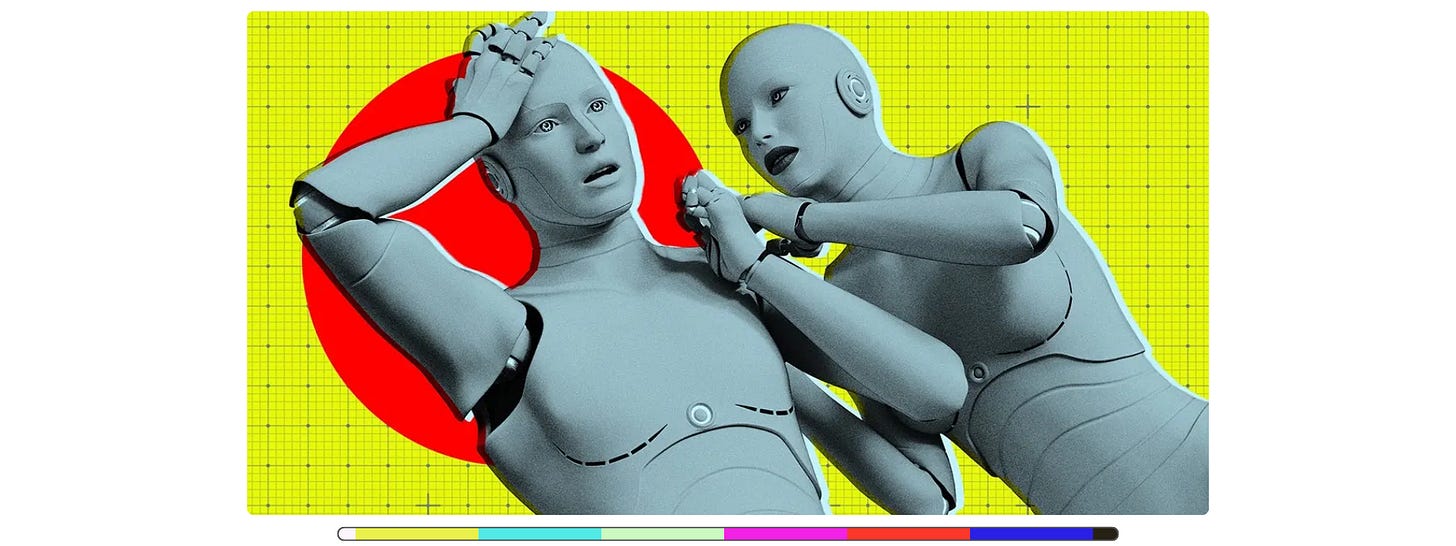Puppets & Prompts
· bland & popular? · emotional % · model collapse ·
This week follows puppet strings and planes, blandness & collapse.
🎧 Prefer to listen? Hit play above to listen to me read this week’s dispatch.
Emotional %: What would you make of actors instructed by AI every step of the way? Think “show 70% anger level”, and '“55% emotional alignment score”. Not dystopian at all! This is quite the story from the Chinese micro drama scene, and I had to look at it.
Curated/Cuts: a beautiful but unfortunately timed spot from India’s national carrier + enjoy the craft of Ohtani vs Ohtani.
Trailer Park: What I dislike about trailers, and a cool analysis.
Bland & popular?: Is Netflix actually making ‘algorithm movies’?
Model collapse What happens when AI learns everytihng?
+ Spotify trying to slide into our DMs, layoffs in Singapore, Youtube’s Hype, and a cute look at a difficult time for the poor em Dash.
As always— plenty to sink your teeth into with The Colour Bar, a collision of creativity, content, culture, tech and brands.
Emotional %
On-screen entertainment is largely fronted by actors. They bring with them charisma, physicality, emotion, looks… connection.
And if the connection is made, we wouldn’t care one bit if AI had made it happen.
Or would we?
“AI is coming for creative skills.” There is already an element of weariness in the reactions to that statement. Many words are shed every week on how to adapt, some words on how to protect, some on how to resist. That other favourite also inevitably enters the frame, ‘AI is a tool’. A tool to enhance our skills, human efforts. This tends to centre around creation- words, graphics, audio, and increasingly reliably, video.
What about when AI is a tool to instruct emotions? Specifically, on-camera emotions.
Telling actors how to act? “Optimising’ their efforts?
In an incredible piece, Oscar Wu details the travails of an actor in the Chinese micro drama (ultrashort drama) scene. ‘Lu’ journeyed from being a film extra to a regular in the exploding micro drama industry. He is now taken aback by how deeply AI is integrated into every production he is part of, including his performances.
Scripts, set design, costumes, these are a given. AI now screens actors in casting, and plots out emotional maps that they must follow for the scripts it has generated. Directors are hyper-focussed on matching the cadence of a character arc and the actors’ expressions, to precise beats prescribed by AI. These systems are optimised for virality, learning constantly from what is trending. Story hooks, specific physical actions, which emotions, how intense they should be- everything comes under the remit.
After analysing hundreds of clips of dramatic scenes, the AI system has plotted a curve along an XY axis, with time on the horizontal and expressions on the vertical. At peaks and troughs are instructions such as “show restraint,” “erupt,” and “furrow your brows.” The actor rechecks the AI-generated script he was sent: “Minute 3 to 4: emotional breakdown.”
This is a story where we encounter phrases as wide-ranging and mind boggling as, “80% anger level”, “optimal emotional curve”, “emotional alignment” score of 45%, “stick with the rhythm given by AI”, “object-throwing scenes go viral”, ‘screened by AI’.
According to the Hengdian Actors Guild, (in the future) actors in short plays will still be required to serve as facial expression stand-ins for AI virtual characters, earning around 15 yuan an hour and repeatedly producing standard expressions of ‘surprise’, ‘anger’, and ‘ecstasy’… "like puppets controlled by data.” (from)
Lu’s story might sound rare, but we can hardly expect it to remain singular. In an ecosystem already fed on platitudes of AI enhancing human creativity, not replacing or dominating it, what is one to make of such pervasive, prescriptive and pernicious infiltration of AI?
The piece is here, translated from the Chinese by Carrie Davies.
Shoutout:
I also explore eclectic & curious storytelling on Coffee & Conversations. Last week, for example, I delved into the first ever photograph that included humans. Have a read?
(Or watch a video piece on it here).➕ Some quick hits:
Social music? Spotify is adding messaging to their platform. Do they want to become a social media network? Do they hope to have people stay on the app longer? Music listening is not the same as ‘consuming’ whatever we do on social media apps, nor like watching on a streaming platform. I suppose this is to foster sharing, encourage more discovery and listening (more so for podcasts?). Either way- not enthused by the suggestion of having to monitor DMs on yet another platform.
That media landscape again: After stoically holding off in recent years, Singapore’s state broadcaster too has eventually felt the need to cut, laying off about 3% of their staff, citing an ‘evolving media landscape’. How about ‘unrecognisable’?
**Marketing: “**Master the timeless stuff because in this democracy of chaos, no one is owed anything neither the biggest spender nor the cleverest AI model. Every second of attention must be earned, again and again.” The democratic chaos of modern marketing’, here.
Creators: Youtube has rolled out its Hype element across 39 countries. What is it? It allows viewers to ‘hype’ up to three videos per week, for creators with under 500k subs. Hype equals points, points mean a chance to be on a ranked leaderboard in the Explore menu.
Amusing: Tired of the em dash being bandied about as unequivocal proof a piece of text has been written by ChatgGPT? Spare a thought for the em dash’s emotions.
Trailer Park
I love trailers, have loved them for years. I worked in promos & trailers too. There was a time I used to download hundreds from Apple Trailers (remember that?). A good trailer still makes me… feel good.
Very occasionally, I have stayed away from certain trailers because I don’t want my excitement blunted, my anticipation dimmed for a much-awaited film. But mostly, I enjoy them, even when the title might be one I’m unlikely to end up watching.
I also detest spoilers. So, the recent trend (few years?) of giving away So Much of the plot in the trailer maddens me. I presume there is some dodgy rationale around attention spans and social media buzz etc, but wow- that, for me, is *the most infuriating bit about trailers in recent times.
For others, its the duration that is a pain point. Stephen Follows, for one, who took it upon himself to analyse 6,926 trailers from 4,004 films over the last 95 years, all to check on his Substack, ‘Have movie trailers always been this long?’
The short answer? “trailer length today is not at some historic high. In fact, trailers used to be even longer for most of the twentieth century.”
🎬 Curated/Cuts.
1. Ohtani vs Ohtani
This spot is from earlier in the year, though that doesn’t make it less enjoyable- if for nothing else, then just for craft & mood. And this, from a not-baseball-fan.
Director: Walid Labri · Love Song · Teddy Santis · DIVISION · Jules de Chateleux · Dan Williams · New Balance Chuck Mauro
2. An Air About India
A couple of months ago, India’s ‘national carrier’, Air India dropped a campaign, “An Air About India”. The timing was far from ideal, coming just ahead of the tragic plane crash in June. The campaign itself is worth a look, with a striking spot soundtracked by Sneha Khanwalkar with rap vocals by emerging rapper QK aka Aarya Jadhao.
This feels like it carries the vibe of their 2024 spot, using the aircraft as a connecting device, though the messaging here seems more international facing than domestic.
Bland, popular, or both?
There seems to have been a general agreement over the last 12-18 months that the era of ‘Peak TV’ is gone, or slowly going. This generally means unique, creative or bold stories are left by the wayside for volume, and bang for buck, though production values tend to remain high. Whether this shift will result in a generally blander film & TV landscape is arguable, though an undeniable concern.
This long-read from Phil Hoad makes a good read for those in the world of entertainment but equally, for those at a distance from it, those who might only consume.
Its central assertion is that Netflix’s data-driven model has ushered in a wave of “algorithm movies”— safe, formulaic, broadly appealing; designed for easy consumption. It leans on some insider takes to make the case that predictive modelling and performance metrics influence what gets greenlit. Netflix, of course, has consistently called such opinions “the misconception that we commission by algorithm”.
The strange paradox of the streaming era is that as the quest to personalise entertainment has continued, entertainment itself is becoming steadily more impersonal. The user, and the fantasy of unlimited choice, is king. The auteur, and singularity of perspective, are now subordinate – and the tsunami of AI threatens to wash them away completely.
While it might be somewhat unfair to paint the entire approach and output of streaming (and Netflix in particular) with the brush of blandness, there is something to be said for this. A slate that was known for strong vision-driven hits has steadily (and successfully, by most metrics) moved to a ‘something for everyone’ and ‘many things for everyone’ line. Backing adventurous auteurs has— significantly though not entirely— given way to risk-averse decisions favouring volume.
“This approach is compatible with what Bela Bajaria, Netflix’s chief content officer, called the company’s “gourmet cheeseburger” model – offering viewers familiar-feeling, mass-market products with upmarket production values. Spread-betting on an inoffensive mainstream, rather than riskily hunting down artistic excellence, is better for sustaining subscriber numbers. People might be drawn to a platform by a single standout title, but they remain on it when they know there will be a steady supply of good-enough titles.” (emphasis mine)
Having said that, the piece contends more with the film slate, and that might suffer more guilt on this account that the series/TV slate.
It also reiterates to me how distribution has become more powerful than ever in this business. The idea that Netflix secured its subscriber base over the years with high-profile, visionary or even auteur-led programming holds merit. But most subscribers are then happy to ‘Netflix and binge’ from what the carousel slides in front of them. Everything is well-made, feels like premium TV. And there’s little denying that even the titles that might be accused of being formulaic, tick that box. It all looks great.
Phil wants us to question whether convenience is slowly crowding out creativity, and that continues to be a relevant debate we should generally not lose sight of.
Model collapse
Model collapse has been spoken about in the last years more than a few times. As It essentially refers to AI feeding off itself, or “low key cannibalism”, if you like- rushing toward the time when all available authentic training data- authentic meaning information produced by humans- will be exhausted. “Some pundits, including Elon Musk, believe we're already there.”
“So if AI is going to run out of training data — or it has already — and plugging it up to the internet doesn't work because the internet is now full of AI slop, where do we go from here? Some folks have suggested mixing authentic and synthetic to produce a heady cocktail of good AI training data — but that would require humans to keep creating real content for training data, and the AI industry is actively undermining the incentive structures for them to continue- while pilfering their work without permission, of course.”
AI that continually trains on its own data is likely to slide further away from fact, reality and human perspective. Worth reading this report and Steven Vaughan-Nichols‘ opinion piece.
Given a choice between good content that requires real work and study to produce and AI slop, I know what most people will do. It's not just some kid wanting a B on their book report of John Steinbeck's The Pearl; it's businesses eager, they claim, to gain operational efficiency, but really wanting to fire employees to increase profits.
Quality? Please. Get real.
I also make videos for some of the stories, if that’s your thing- have a look at Pixel Pandemonium , or Hybrid Docus or my look at Moonvalley.








